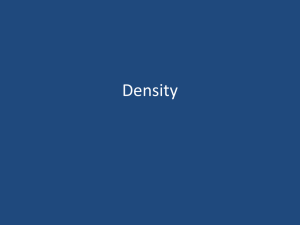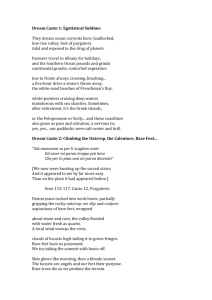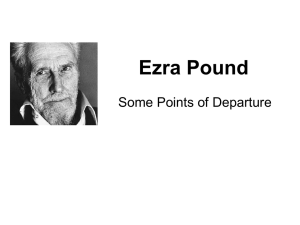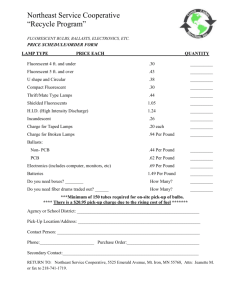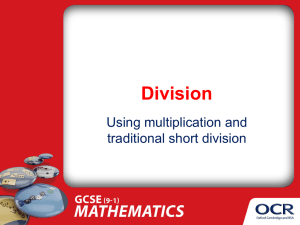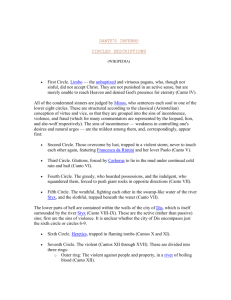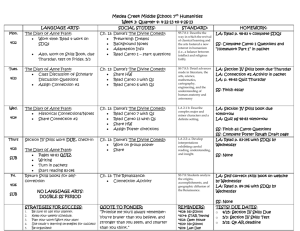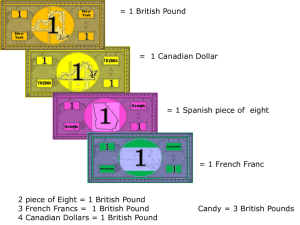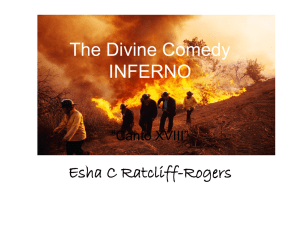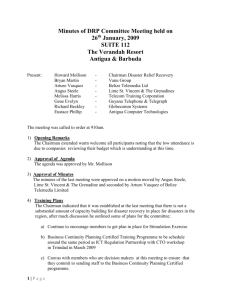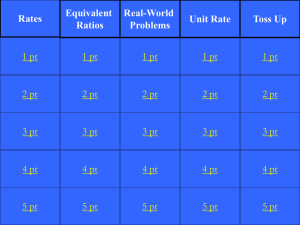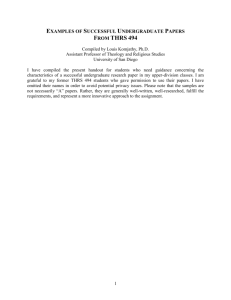File - Jon Thompson
advertisement
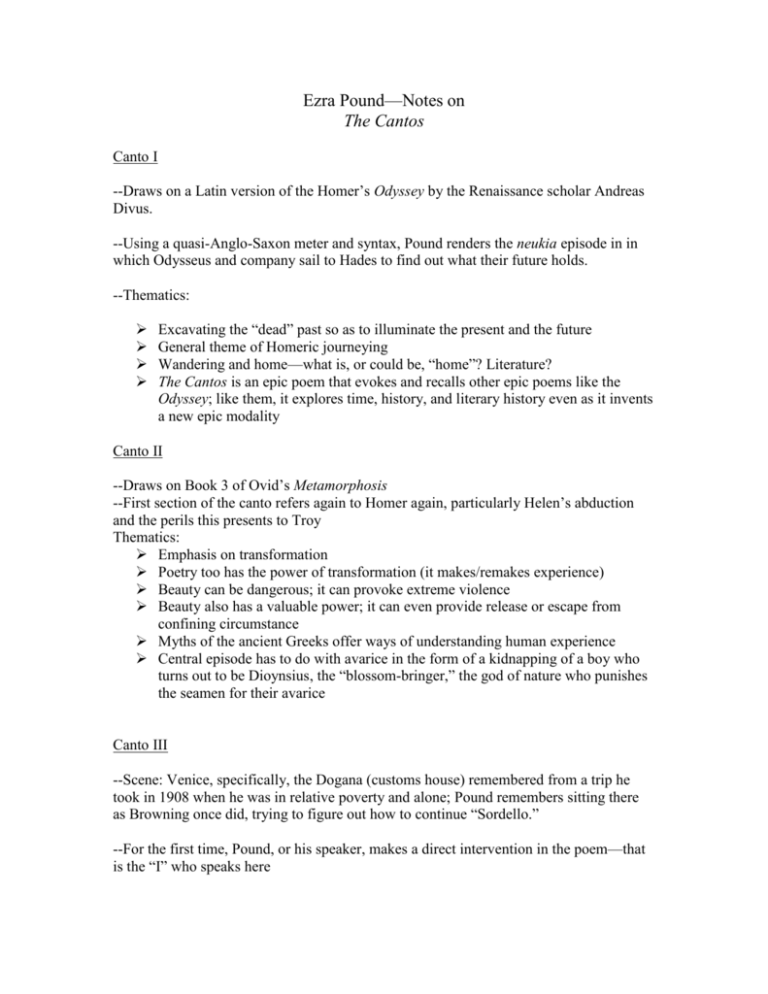
Ezra Pound—Notes on The Cantos Canto I --Draws on a Latin version of the Homer’s Odyssey by the Renaissance scholar Andreas Divus. --Using a quasi-Anglo-Saxon meter and syntax, Pound renders the neukia episode in in which Odysseus and company sail to Hades to find out what their future holds. --Thematics: Excavating the “dead” past so as to illuminate the present and the future General theme of Homeric journeying Wandering and home—what is, or could be, “home”? Literature? The Cantos is an epic poem that evokes and recalls other epic poems like the Odyssey; like them, it explores time, history, and literary history even as it invents a new epic modality Canto II --Draws on Book 3 of Ovid’s Metamorphosis --First section of the canto refers again to Homer again, particularly Helen’s abduction and the perils this presents to Troy Thematics: Emphasis on transformation Poetry too has the power of transformation (it makes/remakes experience) Beauty can be dangerous; it can provoke extreme violence Beauty also has a valuable power; it can even provide release or escape from confining circumstance Myths of the ancient Greeks offer ways of understanding human experience Central episode has to do with avarice in the form of a kidnapping of a boy who turns out to be Dioynsius, the “blossom-bringer,” the god of nature who punishes the seamen for their avarice Canto III --Scene: Venice, specifically, the Dogana (customs house) remembered from a trip he took in 1908 when he was in relative poverty and alone; Pound remembers sitting there as Browning once did, trying to figure out how to continue “Sordello.” --For the first time, Pound, or his speaker, makes a direct intervention in the poem—that is the “I” who speaks here --Various mythological creatures appear to Pound. --Typical Poundian contrast between a richer past and a more culturally-impoverished present. --Half way through the Canto, Pound introduces a reference to El Cid, with the implication that he himself is the outcast, downtrodden, brilliant warrior. --Canto ends with images of desolation; some critics have argued that the decay of the Renaissance is suggested in the final line. Canto XIII --Refers to Kung, or Confucius whom Pound admired and felt that the Confucian philosophy of state offered a coherent vision of a just and orderly state. Chinese philosophy becomes a major part of The Cantos later on. Note that this philosophy is at odds with democratic principles. Canto XVII --Celebrates an earthly paradise --Scene or place is Venice, but Venice transfigured --Draws on elements from Cantos II and III Canto XLV (45) --Thematics: Passionate denunciation of the most potent force of evil in the Cantos— usury or avarice which treats money as a commodity which can be bought and sold rather than as Pound says “a ticket for the orderly distributions of WHAT IS AVAILABLE.” --Usury specifically refers to lending money with interest. A more general meaning of usury is charging high interest for a loan but Pound disagreed with any form of usury. Canto XLIX (49) --The still center of the Cantos --Takes up and develops the themes and emphases of XIII --Thematics: This canto’s imagery speaks with a quiet power, expressing the repose and harmony with the universe of Pound’s Confucianism. Canto LXXXI (81), the “libretto” section Thematics: “With rapt solemnity this lyric, seemingly spoken by Aphrodite, appears to affirm in its third stanza a tentative hope that the poet's creations may not be unworthy to evoke the ultimate mysteries of Being or, in Confucian terms, the Process. After the lyric there is a pause; then the eyes of a courtly love lady, evoked in Chaucer's own fourteenthcentury English, remind us that the eyes ef a goddess are one image of religious mystery in The Cantos. Another pause; then an abrupt shift into a totally different register: And for 180 years almost nothing. That moody comment on the lack of any good poetry set for music after the death of John Jenkins (1678), court musician to Charles I and II, and with the birth of Arnold Dolmetsch (1858) symbolising the possible revival of true lyric, puns us back into the presence of a regretful, discriminating connoisseur of the twentieth century .This connoisseur is also a virtuoso at re-creating the lyric measures of another age, as he has just demonstrated. He has bodied forth for the reader, with conscious aplomb, a creative relationship with what is valuable in the past; and implied also, in the words of that recreative act, is an affirmation that such poetry is an expression of religious mystery.Yet— and this is surely crucial—the calculated artifice of the whole sequence is as marked as the moving quality of the lyric itself. The poet goes out of his way to draw our attention to the artifice by the line 'And for 180 years almost nothing', which is a device for distancing the lyric as well as the Chaucer quotation both from his own self and from the reader. The lyric gracefully ritualises Pound's sense of himself as an artist, which is obviously what redeems him from the despair of the previous section; and by the words of its last stanza it also hints at the religious mystery in which great art can participate. But the lyric's stylistic virtuosity, its prominence in the text as aesthetic gesture, establishes a certain distance between the poet and the mystery he is evoking, just as it distances the reader's response as well. This distance should not be seen as evasion or inadequacy .It is a kind of spiritual tact which enables Pound to put his stylistic virtuosity to the service of, his awe at the mysteries contemplated. The artful rhetoric, and then the sudden change of tone, have the effect of establishing a remoteness from the religious wholeness craved. So too a hint of distance and loss is the silent companion of the exquisitely moulded cadences of this slightly later section of Canto 81:”What thou lovest well remains, the rest is dross…” To call this parody or pastiche on account of its archaic mode is far too crude. It is wonderfully moving in its own right. The poet seems to be claiming to have exorcised Vanity through having seen what is man's limited place in the scale of a green world in which 'it is not man / Made courage, or made order, or made grace'. And there is an odd suggestion of the eighteenth century in the cosmos evoked; a Scale of Being that recalls Pope's Essay on Man as well as the Book of Ecclesiastes. The celebration of such a cosmos, in such an archaic mode, creates a slight gap between the reader and the religious insight conveyed. Hence the evocation of cosmic order has an undertone of remoteness in its assertions of consummated insight and possession. Moreover the assertion of cosmic order, in the latter part of the quotation, does not quite chime with the awestruck yet wistful agnosticism of earlier lines: 'Whose world, or mine or theirs / or is it of none?' These lines, placed amid the variously rendered 'What thou lovest well' refrains, augment a curious impression of sadness pervading the seeming assertion of spiritual triumph. The iterations have a dying fall. It is as if the poet is inventing as he goes along certain rituals for the articulation of his religious need, and these personal rituals carry an oblique hint of distance and loss in the estranging formality of their idiom. The refrains and the repetitions of ritual can also be a sophisticated means of inducing and sustaining religious emotions, and of this we shall shortly meet other examples…. Did not Pound in some sense envisage even the religious wholeness of the universe in aesthetic terms? To see the universe as one harmonious organism of interpenetrating vital forces in which there is 'no duality' is, in an extremely elevated sense, to see the universe as a work of art, self-sustaining and entire in itself. In politics, too, Pound admired the 'factive' personality who creates from dissident elements some harmonious totality. In Cantos 81, 82 and 83 the political element has been in abeyance as the poet creates his own rituals of religious contemplation. The materials of that religion may be ideologically eclectic, but their poetic embodiment is singularly pure and authentic, intimating with a fine elegiac tact the obscure intermingling of religious wholeness with distance and loss.” from Ezra Pound and The Pisan Cantos. London: Routledge, 1980. Copyright © 1980 by Anthony Woodward
